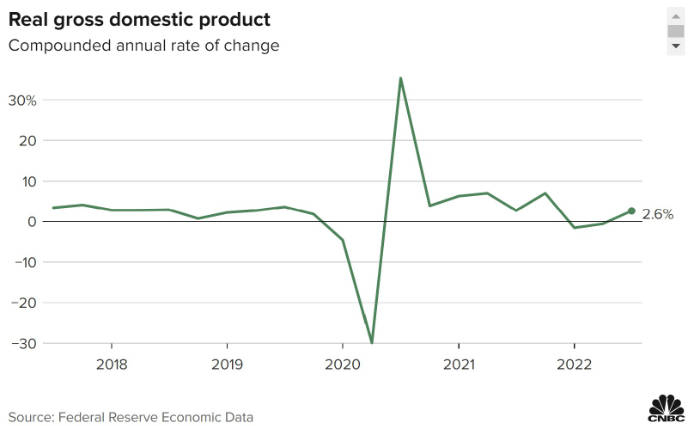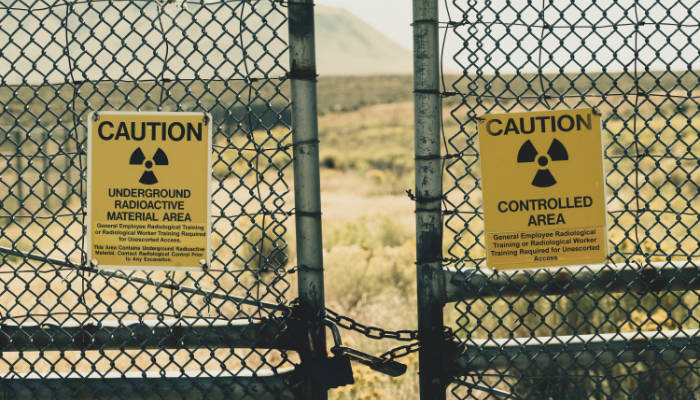In short:
- WHO warns drug-resistant fungal pathogens are on the rise.
- Europe has excess natural gas but the market will be tight until 2025.
- Australia announced a buyback scheme for flood victims in NSW.
US GDP grew 2.6% in Q3; Fed might slow pace of rate hikes in December; Europe has excess natural gas but the market will be tight until 2025.
The US economy rebounded with a GDP growth of 2.6% in Q3. Consumer spending, nonresidential fixed investment, government spending, and a narrowing trade deficit contributed to these gains. But the consumer spending rate slowed from the previous quarter.

The Fed is expected to raise interest rates to another 0.75% next week but might slow the rate hikes in December. US home prices could fall as much as 20% in 2023.
Affordable Care Act (Obamacare) policies will rise 4% in 2023. However, most enrollees shouldn’t feel the increase thanks to an extension that will last until 2025. The article has more info about the changes. A reminder that open enrollment launches November 1, and it might be a good idea to shop around for better (or more affordable) coverage.
Public Service Loan Forgiveness (PSLF) waiver ends October 31, but nonprofits and government workers can still get it. Beware, this isn’t about the one-time Federal Student Loan Debt Relief. The article has more details, or check the thread below:
News: ED is announcing a one-time action to bring all federally managed loans closer to forgiveness, including credit toward Public Service Loan Forgiveness (PSLF) for borrowers who have qualifying employment. https://t.co/2GuSNFz0Yt
What does this mean for you? [🧵 ⬇️ ]
— U.S. Department of Education (@usedgov) October 25, 2022
The Black Sea Grain Export deal could be extended beyond mid-November. The deal was initially agreed to for 120 days. A European diplomat believes that Putin will use the grain deal as leverage at the G20 summit next month.
Europe now has so much natural gas that prices dipped below zero. EU gas storage facilities are almost 94% full, and tankers carrying liquefied natural gas (LNG) are lining up at ports, unable to unload their cargoes, causing prices to tumble. Analysts say lower gas prices will allow European fertilizer producers to restart operations.
Natural gas exporters warn that the market will be tight until 2025 or 2026, until new projects being developed will come online.
Ukraine told refugees not to return this winter because Ukraine’s power grid has been under constant attack and cannot generate enough power for everyone. Kyiv’s local energy supplier says that blackouts could last longer than a previously planned schedule of four-hour outages and that the capital already faces an electricity deficit of about 30% or more.
WHO warns that drug-resistant fungal infections are on the rise; Moderna will work on vaccines against various biological threats.
WHO issued the first list of fungal infections and warns that drug-resistant strains are on the rise. Fungal infections often strike people who are already severely ill. According to the report, climate change has led to more pathogens over a wider geographical range, and drug resistance is being driven in part by the overuse of antifungals in agriculture. The most dangerous is Candida auris, which is highly drug-resistant and has caused a number of outbreaks in hospitals worldwide.
Fungal pathogens can cause illnesses and death.
They are becoming increasingly common and resistant to treatment.Yet, too little is known about them.
The 🆕 WHO fungal priority pathogens list is an important step to boost urgently needed research:
📌 https://t.co/cXgj2HPZIc pic.twitter.com/4LgdIqf4Lo— World Health Organization (WHO) (@WHO) October 25, 2022
Moderna is closing a deal with the US DoD to make mRNA vaccines against a range of biological threats, including Ebola. However, it is unlikely that any vaccines would be ready to use in time to help with the current outbreak in Uganda.
Late-October tropical development possible; Australia announcing buyback scheme for flood victims.
A late-season Atlantic tropical activity could pose trouble for the US and the Caribbean:
AccuWeather's Bernie Rayno details why he's keeping an eye on both the Caribbean and the southwest Atlantic over the next week. https://t.co/FJMQL243pJ
— AccuWeather (@accuweather) October 28, 2022
A 5.1 earthquake struck San Jose in the Bay Area. And almost 100,000 residents had up to an 18-second warning through the MyShake app. The MyShake app is free to everyone but works only in California, Oregon, and Washington, and it notifies users of an earthquake that is 3.5 magnitude or higher.
Nigerians affected by devastating floods are forced to use floodwater despite cholera risks. It is estimated that almost one in ten Nigerians experienced flooding so far in October. More than 600 people died, and 1.5 million have been displaced. There are currently 20,000 people still living in displacement camps.
The Australian government announced a voluntary buyback scheme for flood victims in the NSW Northern Rivers region. The program will also include assistance for up to $100,000 for house raising and $50,000 for retrofitting to better building standards. The NSW State government launched a Resilient Land Program at the start of September to unlock suitable land for housing. The program aims to identify properties of at least two hectares out of the flood zone and close to existing amenities.
Almost a dozen EVs caught fire during flooding caused by Hurricane Ian. The fires are believed to be due to the cars’ battery packs shorting out after being submerged in saltwater or physical damage to the batteries during the flooding. The article has advice on what to do if your EV is damaged after a flood.
Thousands of Sandy victims in NJ are still paying for the superstorm 10 years later.
And here’s a good reporting from WaPo about What it’s like to leave one flood-prone community (paywall).
Russia denies needing to use nuclear weapons but keeps talking about dirty bombs; Ukraine says Russians are doing secret work at Zaporizhia nuclear plant.
Putin spoke at a conference of international policy experts and seemed to back down on nuclear threats: “There is no point in that [i.e. using nuclear weapons], neither political, nor military.” but repeated claims that Ukraine is preparing a dirty bomb. Ukraine’s nuclear energy operator (Energoatom) alleged that Russians are doing ‘secret’ work at the Zaporizhia nuclear plant and is assuming it must have to do with the dirty bomb threats. The US sees no evidence that Russia is preparing or intends to use one. But some Western officials say that it might be more difficult to find out about a dirty bomb, as opposed to a conventional nuclear weapon which requires logistics that can be traced.
NATO chief warned of “severe consequences” if Russia fires nuclear weapons. “We have seen before that Russia has accused others for doing what they intend to do themselves,” he said. “So therefore, we are sending a strong message to Moscow that they should not try to use a false pretext as an excuse for escalation of the war in Ukraine.”
The US and Russia are currently keeping a line of communication open in order to manage escalation and prevent potential miscalculations. Blinken said that the consequences of Russia using a nuclear weapon have been conveyed “directly and very clearly” to them.
The rest
A new report from UNICEF warns that virtually all children will experience more frequent heatwaves by 2050. Heatwaves are a danger to children because they are less capable of regulating their body temperatures than adults. According to the report, northern areas such as Europe will face the “most dramatic increases” in heatwave severity.
A couple of signs of dehydration in infants (from the How to survive severe heat guide):
- Pay attention to changes in potty patterns. The lack of wet diapers is a clear sign.
- Another sign is if the child cries, but there are no tears. You might also notice darker “sunken” eyes.
Check more conversations about how to prepare for heat waves here.
A couple of articles about preppers: Britons preparing “blackout boxes” and The ‘preppers’ stockpiling food and generating their own electricity.

You are reporting the comment """ by on